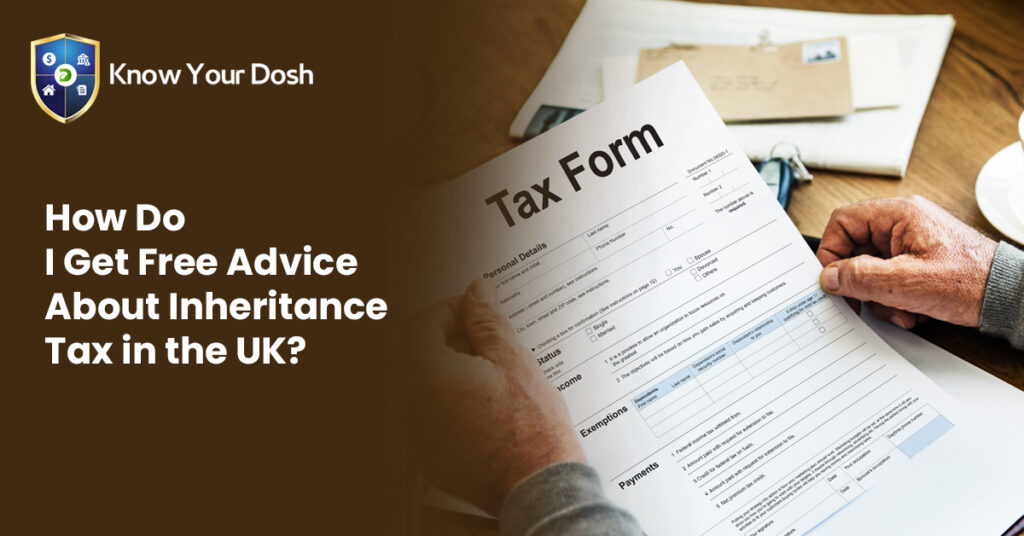If you are between the ages of 40 and 80 and living in the UK you may be wondering about inheritance tax and how it could affect your hard-earned assets when you pass away. Don’t worry; you’re not alone. Inheritance tax, also known as estate tax, is a complex topic that often leaves people feeling overwhelmed and uncertain about their financial future.
In this blog post, we’ll simplify inheritance tax and provide you with valuable information on how to get free advice to ensure your assets are distributed according to your wishes while minimizing the tax burden on your loved ones.

What is inheritance tax in the UK?
Inheritance tax in the UK is a 40% tax levied on the portion of your estate that exceeds the current threshold of £325,000 for the 2023/24 tax year. Your estate includes the total value of your assets, such as property, investments, and personal possessions, minus any outstanding debts and mortgage balances.
For example, if your estate is valued at £600,000 and you’ve made no prior inheritance tax planning, your beneficiaries would need to pay 40% tax on the £275,000 that exceeds the £325,000 threshold, resulting in a tax bill of £110,000.
How can I get free inheritance tax advice?
Fortunately, there are several options available to obtain free inheritance tax advice in the UK. Here are some resources to consider:
1. Government websites
The UK government provides comprehensive information on inheritance tax through its official websites, such as GOV.UK and HM Revenue & Customs (HMRC). These websites offer detailed guidance, tools, and calculators to help you understand the rules, rates, and exemptions.
2. Charitable organizations
Many reputable charitable organizations, like Age UK and Citizens Advice, offer free inheritance tax advice to individuals within certain age or income brackets. Their knowledgeable advisors can provide personalized guidance and answer your specific questions about inheritance tax planning.
3. Local libraries and community centers
Check with your local library or community centre, as they often host free seminars or workshops on inheritance tax and estate planning. These events can be a great opportunity to learn from professionals and gain insights from others in similar situations.
4. Online forums and communities
While not a substitute for professional advice, online forums and communities dedicated to personal finance and retirement planning can be valuable resources for gathering information and insights from others. However, it’s crucial to exercise caution and verify any information you find online.
Tips for effective inheritance tax planning
While seeking free advice is a wise first step, it’s also important to consider professional assistance for more complex inheritance tax planning. Here are some tips to help you navigate the process effectively:
– Start planning early: Inheritance tax planning is most effective when done well in advance, as some strategies may require several years to implement fully. For instance, if you plan to gift assets to your children or grandchildren, doing so over several years can help reduce the overall tax burden.
– Keep accurate records: Maintain detailed records of your assets, liabilities, and any gifting or transfers made during your lifetime, as these will be crucial for inheritance tax calculations. This can include property deeds, investment statements, and records of valuable personal possessions.
– Consider professional advice: For more complex estates or specialized planning needs, seeking advice from a qualified tax professional, financial advisor, or solicitor can be beneficial. They can provide tailored guidance and strategies to minimize your inheritance tax liability.
– Review your plan regularly: Your circumstances and the inheritance tax rules may change over time, so it’s essential to review and update your plan periodically to ensure it remains aligned with your goals and current regulations.
Taking advantage of free inheritance tax advice resources and following best practices for inheritance tax planning, you can ensure that your assets are distributed efficiently and according to your wishes, minimizing the tax burden on your loved ones.
Navigating tough conversations about money and legacy
Discussing inheritance tax and estate planning can be a sensitive topic, often involving difficult conversations with family members. To help you navigate these conversations with ease, we’ve compiled an e-book titled “Bridging the Gap: A Family’s Guide to Navigating Tough Conversations About Money and Legacy.”
This comprehensive guide provides practical tips and strategies for initiating open and honest dialogues about financial matters, addressing potential conflicts, and ensuring your wishes are understood and respected by your loved ones.
Download our free e-book here and take the first step towards securing your family’s legacy while minimizing the burden of inheritance tax.








